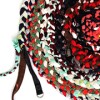From L.A. to Guatemala: Day Labor Theater Without Borders
In Los Angeles alone, there are about 25,000 day laborers. The laborers range from gardeners to construction workers to painters to movers to childcare specialists, and well, just about any form of temporary labor there is. Many day laborers are immigrants, and some are in the country without proper immigrant status, leaving them with few bargaining chips to improve their standing with work conditions and wages. This can lead to sometimes-difficult lives. Add on top of that anti-immigrant policies and attitudes that leave some day laborers feeling helpless and targeted. These are some of the reasons Teatro Jornalero Sin Fronteras (translated as Day Labor Theater Without Borders and abbreviated as TJSF) began in 2008.
The theater has produced 15 short plays since its inception, usually with a 10-person troupe, and performed mainly at the 14 day labor centers around L.A. In the past year, TJSF has expanded their horizons, bringing their theater to other important day labor locations like El Salvador and Northern California, and most recently to Guatemala, where they teamed up with a theater company called iiK to exchange techniques and work with laborers who both immigrated to Los Angeles and were deported from L.A. and currently reside in Guatemala.
Lorena Moran, the Program Director of TJSF heard about iiK through her academic associate Sergio Morayata at the University of San Carlos in Guatemala. "He told me they were a group of young students and graduates who were interest to cooperate with underserved communities without economic and educational opportunities in Guatemala. This was the reason why my interest was awakened," Moran, who has been with TJSF since its inception, tells me in an email. "The program started from my idea of planting the seed of community theater in young Guatemalan artists. We started our project six months through Facebook conversations and emails, before our exchange in January 2014 in Guatemala City."


Moran secured a grant for TJSF from the Department of Cultural Affairs' Cultural Exchange Program, which allowed the troupe to travel to Guatemala City and set up shop. "I believe that our goal was reached to sow the seeds of interest in young Guatemalan artists, and put in practice the theatrical experiences and provide creative space for community members who were left in the past and without opportunities," says Moran.
During the exchange, Moran concentrated on a specific moment in America's pockmarked immigration history -- the I.C.E. roundup of immigrants from the Agriprocessors plant in Postville, Iowa in 2008. "Our target group was a group of people deported from the U.S. to Guatemala in one of the biggest raids of the last 10 years," says Moran. "297 were deported to Guatemala. They're from Calderas, Chimaltenango [a community near Guatemala City], and they were left in the past, without opportunities. iiK provide workshops of basic acting techniques, and, I, as a representative of Day Laborer Theater Without Borders, shared the technique of creating historical circles, which is the technique that we practice here in Los Angeles, with the members our artistic ensemble."
Along with sharing theater techniques, TJSF wrote scripts with the young Guatemalans, culled from stories from the communities. These resulting scripts were created for plays that can be performed both in Guatemala and in Los Angeles. "We came to know the stories of people who were deported, and those histories would be represented through a written script," says Moran. "[We paid attention to things like] the experience of when they were received in their country of origin, and how they envision their future surrounded by economic deprivation, without opportunities, and with debts incurred by lending money under their title deeds to pay for the trip that supposedly would lead towards the realization of the American Dream."


Read more about day laborers in Los Angeles from Artbound:
The Worker's Rug: Fine Art From Day Labor
The Workers' Rug/La Alfombra Del Trabajador is an art done by day laborers in collaboration with artists, the Craft and Folk Art Museum, and the Instituto de Educación Popular del Sur de California. It codifies the experiences of workers woven together with their t-shirts.
Dig this story? Sign up for our newsletter to get unique arts & culture stories and videos from across Southern California in your inbox. Also, follow Artbound on Facebook, Twitter, and Youtube.
